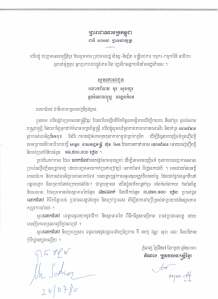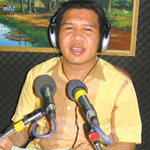Lift sent out questions to four Cambodian scholars who have returned from studying abroad to help in the development of their home country. Their answers shed light on the drastic differences between education systems overseas and in Cambodia, but also on the value of becoming part of a different culture and a different way of life. These answers are excerpted from their email responses and edited for length and clarity.
Sun Samnang:

Sun Samnang/ Photo supplied
Age: 31
Studied law at the University of Hawaii at Manoa through the Freeman Foundation Fellowship. This scholarship was privately funded and advertised, but students who want to study in the US can visit the US embassy website to browse a variety of scholarship opportunities. Sun Samnang is currently working as a lecturer of law at Pannasastra University and the University of Cambodia.
For more information about this scholarship programme visit:
cambodia.usembassy.gov/
educational_exchange2.html
Mol Vibol:

Mol Vibol/ Photo supplied
Age: 27
Studied educational science and school administration at the University of Moncton in Canada through the Canadian Francophone Scholarship Programme. Mol Vibol is currently working as a lecturer at the Cambodian Institute of Technology.
For more information about this scholarship programme visit:
www.boursesfrancophonie.ca/
Sang Sothun:

Sang Sothun/ Photo supplied
Age: 24
Studied in Lyon, France, through the Eiffel Excellence Scholarships Programme. He has been working in Cambodia’s government since returning to the country. He also works as a part-time lecturer and freelance translator to supplement his income.
For more information about this scholarship programme visit:
www.egide.asso.fr
Loa Narin:

Loa Narin/ Photo by: Koam Tivea
Age: 24
Studied at Macquarie University in Sydney, Australia on the Peace Scholarship programme. This particular scholarship is no longer available, but there are various other scholarships being offered by the Australian government. Loa Narin worked for an NGO upon returning but is now working for the Institute of Foreign Languages as a full-time lecturer.
For more information about this scholarship programme visit:
www.cambodia.idp.com/
DISCUSSION
What was one thing you realised studying abroad that you couldn’t have learned here?
Mol Vibol: Teachers in Canada didn’t seem like teachers at all. They treated us as their friends, brothers or sisters, unlike Cambodian teachers who often have too much pride or do not teach their students well. In Cambodia we can see a gap between students and teachers, as students do not want to disturb their teachers and are afraid to ask questions to them.
Loa Narin: The independence in studying and living abroad was invaluable. The experiences have broadened my horizons and enabled me to be more confident and more mature as an individual.
What were the main differences between your education abroad and education here?
Sang Sothun: The quality of the studies in France can be seen on exam day. I don’t know what happens up there, maybe the rules are so strict or maybe students there never cheat on exams because of their conscience. The results are catastrophic if someone cheats. They would rather fail than cheat.
Loa Narin: The lecturer’s job is to facilitate the students’ studies and students have to be very independent in their studies. At the university I studied at, students met once or twice a week to sit with a sea of 200 or more students to listen to a lecture, which lasted from an hour to 90 minutes. The class then breaks down into “tutorial” groups where 25 or so students have discussions with tutors where they solve problems, ask questions and do presentations. The facilities were also state-of-the-art. For instance, the “i-lecture” is a system that records the lecturer’s words during their classes and posts them online for students who were absent or didn’t understand some points. They can listen to the lecture from anywhere, any time, through the internet.
Mol Vibol: Teachers in Cambodia explain the entire lesson on the whiteboard and the students just take notes on the information. In Canada, teachers give assignments to students and let students research by themselves. In Canada teachers have the obligation to guide and help their students when they need assistance, but they don’t have to help their students do everything.
How has your experience abroad improved your abilities and performance in your job?
Sun Samnang: One thing I know is that I would not be able to do what I am doing now if it weren’t for the education I received. I have a responsibility to channel correct information to students and assist them in conducting research and getting through their academic journey, and I wouldn’t be able to do that if I myself were not equipped with those skills and experiences.
Loa Narin: As a result of the experiences I had in Australia, my confidence has soared and I am a better communicator, not just in my English ability per se, but also in my ability to interact with people across different cultures.
Mol Vibol: I treat my students as brothers and sisters and try to help them learn in a relaxed way. I think this method works well because when students learn due to their own passions – rather than other people forcing them in one direction – they will make much better progress.
How will you use your experiences abroad to help develop Cambodia?
Mol Vibol: If I were a director of a university I would give more chances to other people who are qualified and capable of working, not someone I knew or a relative. Moreover, I like talking and helping people so I will use my experience to share with my students and I will encourage and advise my students to work harder for their future.
Sun Samnang: I believe that teaching is one of the most noble professions there is. I see the role of education as being tremendously important in building a strong generation of youth. Teaching isn’t just about giving students something that is in books, it is about giving them the ability to think and generate ideas.
Sang Sothun: Serving your country to help its develop should be promoted and established in the minds of Cambodian people. One person cannot change the world. I am just one part of Cambodia. What I can do is to try my best to serve this country and that’s why I choose to work in the public sector.
By: Dara Saoyuth & Koam Tivea
This article was published on Lift, Issue 25, June 30, 2010









